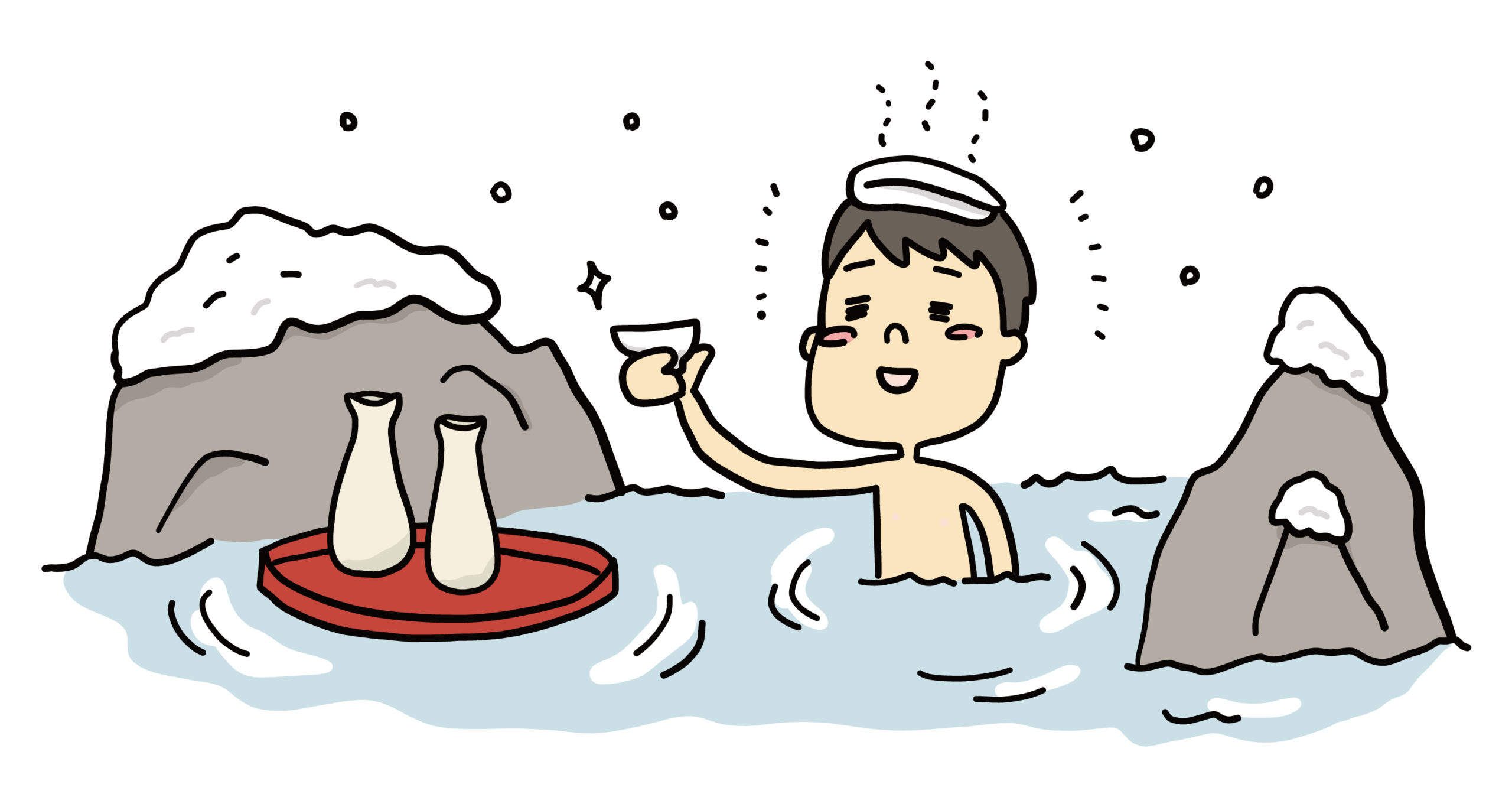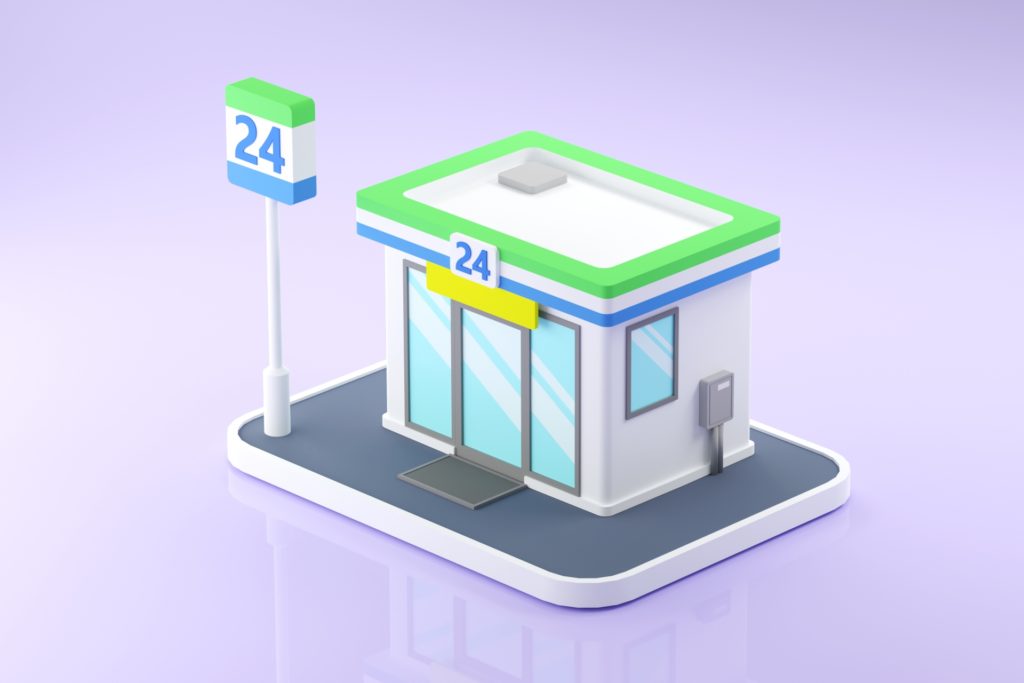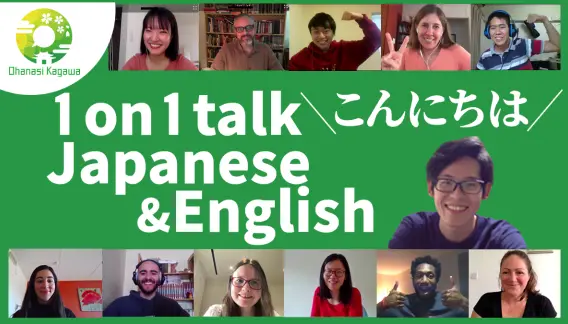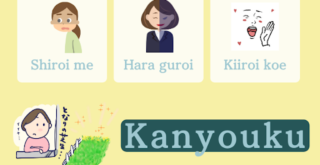
Japanese Culture
2022.11.15
Let’s go to an Onsen (hot spring)! How to enjoy Sento (public bathhouses)
Do you know what a “ スーパー銭湯 (せんとう) Super Sento” is? 銭湯(せんとう) is a public bathhouse. If you pay money, you can take a bath in a hot spring.スーパー “ means “great,” so a スーパー銭湯(せんとう) is more than just a bath house.There are restaurants, manga corners, massages, and many other services in addition to the baths.スーパー銭湯(せんとう) have been popular in Japan for several years.In the past, public bathhouses were considered to be for the elderly, but スーパー銭湯(せんとう) are now also becoming a dating spot for young couples.For about 2,000 yen, you can enjoy yourself all day long. Now, let me show you how to enjoy a スーパー銭湯(せんとう). The first step of enjoying Super Sento There is a shoe box at the entrance. First, take off your shoes. Lock (key) the shoebox. This picture is of a wooden shoe box. The key is also made of wood.The key has a number on it, so you don’t have to worry even if you forget where your shoes are.Once inside, there is a reception desk. In most cases, the receptionist will keep the keys to the shoe boxes. You can borrow towels. Some places offer free towels, and some charge a fee.I go without any, but my friends bring towels, shampoo, and body soap.You will receive a belt with a key, so put it on your wrist or ankle.You can put the key inside, just like in the picture.You can use this belt to shop and pay when you leave the store. What is "のれん"? There are separate men’s and women’s baths, so make sure you enter the right one.The public bathhouses have a cloth called “のれん Noren” (curtain).In most public bathhouses, blue is for men’s baths, and red is for women’s baths. Take off your clothes in the changing room (だついじょdatsujijo) and put them in a locker.After locking your locker, it is time to enter the hot spring.Before getting into the bathtub, take a shower to wash off your body.Be careful not to get your towel into the hot water, and enjoy the hot spring bath.No swimming! The most exciting time for me is after bathing in the hot springs.There is a vending machine (じどうはんばいき jidohan-baiki), so I have a cold drink.Milk, fruit milk, and coffee milk are popular, and my favorite is coffee milk. Caution at Super Sento At スーパー銭湯(せんとう), you can freely move between the hot spring section, manga corner, and restaurant.You can enjoy the hot springs as many times as you like while resting with manga and food at rest areas.One thing you should be careful of is that tattoos are not allowed in many Japanese hot springs.Please check the スーパー銭湯(せんとう) rules carefully and ask the staff at the スーパー銭湯(せんとう) if you are unsure about anything. I hope you could understand how good my favorite spots are.If you ever come to Japan, you should definitely visit a スーパー銭湯(せんとう)! Let's talk about Super Sento at Ohanasi Kagawa Events with Japanese people. Join Ohanasi Kagawa events →

Japanese Culture
2022.11.14
Japanese Convenience Store Experience! What does it mean, “おべんとうあたためますか?
If you like Japan, you probably know how wonderful Japanese convenience stores are.Even in anime and manga, there are many fascinating stories about convenience stores.When you travel to Japan, one thing you should definitely put on your list of things to do is to shop at a Konbini!Convenience stores are full of delicious food and fun things to do. Seasonal sweetsNewly Released OkashiUnique Japanese sweet bread and ice cream No matter when you visit a Konbini, you will always find a variety of exciting products. To enjoy shopping at these Japanese convenience stores, I will teach you one phrase that you may hear at a convenience store. I will also introduce how to buy a convenience store bento box in Japan, and recommend some delicious convenience store foods. Read this article and expand your conversation on the topic of your favorite Konbini! ※ Konbini is a convenience store in Japanese Fun to buy bento at a convenience store. One of the things you look forward to in Japan is experiencing the food culture.We recommend trying the obento culture that is becoming popular in other countries as well.Convenience stores have a wide variety of obento available for you to try. Generally, a bento consists of rice and side dishes. A donburi is a bowl of rice topped with a side dish. Onigiri, sushi sets, and other standard bento are available. If you visit a Konbini for the first time, you must be surprised at the great variety of bento and the low prices. Let’s get familiar with the Japanese bento culture at a Konbini! 「お弁当あたためますか?」 When you buy a bento, the cashier will always ask you this phrase.The phrase means whether you want to heat up the bento you bought or take it home as it is.This is a service to make your bento tasty.Bento boxes are placed in the refrigerated zone for sanitary reasons. The cashier will heat up your bento in a microwave oven. レジ係(がかり)「お弁当(べんとう)あたためますか?」 Cashier“Would you like to warm up your bento?” お客 (きゃく)「おねがいします」 Customer“Yes, please. Wait a little while for the microwave oven to warm up the bento. You have to be careful. Ask the cashier to warm up your bento or rice bowl. Onigiri is tasty either cold or warm, so it doesn’t matter whether you warm it up or not. You should not warm up sushi. 「お弁当(べんとう)あたためますか?」“Would you warm up your bento?”If you know this phrase and what it means, you can definitely enjoy your bento at a convenience store! Try these convenience store foods There are convenience stores all over the city.Each store has its own unique characteristics.Each convenience store has its own delicious convenience store food. If you know these items, Japanese people may recognize you as a specialist in Japan! セブンイレブンの「おでん」(冬限定) Seven-Eleven’s “Oden” (winter only) ファミリーマートの「ファミチキ」Family Mart’s “Famichikiローソンの「からあげくん」Karaage-kun” by Lawsonミニストップの「ソフトクリーム」Ministop’s “Soft ice cream These are regular convenience store foods, so you can easily find them.I highly recommend these tasty items, which even if you eat them for the first time. Let’s talk about convenience stores at Ohanashi Kagawa! Join Ohanasi Kagawa Event →

Japanese Culture
2022.11.13
Japanese Soul Food! Let’s Try Udon Noodles!
We will talk about the famous food of Kagawa Prefecture, home of Ohanashi Kagawa. In Japan, Kagawa Prefecture is best known for its udon! People in Kagawa eat udon for lunch two or three times a week. Kagawa is also known as Udon prefecture because of its many delicious and reasonably priced udon restaurants. Isn't it amazing? Of course, you can eat udon not only in Kagawa Prefecture, but anywhere in Japan. Udon has been around for a long time and can be called Japan's soul food. Sushi, tempura, and ramen are not the only delicious foods in Japan! Today, we will explain what kind of food udon is and why it is popular among Japanese people. What kind of food is Udon? Udon are white, thick noodles made of wheat flour. There are two types of udon: hot and cold. Both are eaten with Japanese soup stock. Types of Udon Udon can be found anywhere in Japan. There are various types of udon, depending on the region. Here are some of the common types of udon found in every region. かけうどん"Kake Udon" is a simple udon consisting only of noodles and soup stock. きつねうどん"Kitsune Udon" is udon topped with fried bean curd cooked in a sweet and spicy sauce. ぶっかけうどん"Bukkake Udon" is udon with boiled noodles and thick broth poured over them. にくうどん"Niku Udon" is udon topped with seasoned meat. てんぷらうどん"Tempura udon" is udon topped with shrimp and vegetable tempura. カレーうどん"Curry Udon" is udon with curry and broth. Where udon can be eaten Udon specialty restaurant Japanese restaurants Self-service restaurants in food court What do you mean by こしがある"firm" udon? When describing the texture of udon noodles, people use the word "koshi (firm)." Udon with "koshi (firmness)" are noodles that are chewy and firm. This is an important point for udon. It is similar to the al dente pasta that Italians value. Sanuki udon from Kagawa Prefecture is a typical example of udon with "koshi (firmness)." In Japanese udon culture, there are also udon without "koshi (firmness)." In the Kansai and Kyushu regions, soft and chewy udon is popular. The fact that each region from Hokkaido to Okinawa has its own particular udon culture means that udon culture is widespread in Japan. What do you mean by udon that "slide down the throat." のどごしがいい "Good nodogoshi" is another word used to describe the taste of udon. It is used to describe how smoothly the noodles slide down the throat. This term is used for noodles that are eaten by slurping, such as soba and ramen. Udon are a great way to end a sukiyaki meal. The fun part of nabe dishes is to add your favorite shime ingredients and eat them at the end. There are three types of shime ingredients: udon, rice, and ramen. Udon is recommended as a shime ingredient for sukiyaki. Udon goes perfectly with the sweet and spicy broth with dashi. If you have a chance to eat sukiyaki, try saying, "I'll have udon for shime." You will be recognized as a foreigner who understands Japan! Become an udon expert and join Ohanashi Kagawa!

Learn Japanese
2022.11.12
Do Japanese People Speak English in Daily Conversation?
Many people from many countries are looking forward to coming to Japan as they have been waiting for a long time as the restrictions on entry into Japan by the Corona are being eased. However, if you are coming to Japan for the first time, you may be worried about whether or not the Japanese can understand English when you speak to Japanese people in English or whether Japanese people speak English or not. Knowing whether Japanese people speak English before you come to Japan may help make your visit to Japan more enjoyable. The writer of this article was born in Japan, graduated from high school under the Japanese English education system, and then went on to study psychology at a university in the U.S. using English, which is not my native language. Through my study in the U.S., I learned the reality that the English I had learned in Japan were completely useless, and I wrote this article based on my experience of thinking about and researching why so many Japanese do not speak English. Only 2.5% of the Japanese population speaks English? Survey of 1,000 Japanese people by a Japanese company. Can you imagine how many Japanese speak English?In 2017, Kodansha Co., Ltd. in Japan surveyed 1,000 Japanese men and women in their 20s to 60s who had never lived overseas or studied abroad and had learned English only through school education in Japan (we call them “Zyunzyapa”). The results revealed the current situation of Japanese people’s English levels and attitudes toward English. Referrer https://kyodonewsprwire.jp/release/201701057627 Only 2.5% answered that they can speak and listen to English without problems Kodansha Co., Ltd. took surveys of Zyunjapa (Japanese people who received their English education only in Japan) and found that surprisingly, only 2.5% of Zyunjapa have the ability to speak and listen to English conversation without problems and only 2.2% of the Japanese people said their speaking ability was at a level that would allow them to do their jobs.How do you feel about these results? Many Japanese people today study from elementary school through university and Japanese who go on to university have had 16 years of English education in Japan. It is hard to believe that only 2.5% of Japanese can speak and listen to English without any problems. Almost half (43.5%) of the Japanese people said that they can hardly speak at all, and 49.9% said that they can speak at the level of Japanese elementary school students (i.e., they can say a few words they know). Only 20% of Japanese people answered that they could answer when asked for directions by English speakers How many of the Japanese people you ask for directions when you actually come to Japan are able to answer in English?According to a survey of 1,000 Zyunjapa (Japanese who received their English education only in Japan), only 20% of Japanese people could answer in English (21.8%) when asked for directions by English speakers. Therefore, if you ask 10 Japanese people for directions in English, only 2 Japanese people will answer correctly. Many Japanese will be panicked when suddenly spoken to in English. Why do Japanese not speak English? So why are so many Japanese who cannot speak English so well? While it is true that there are differences in grammar and pronunciation between Japanese and English, these are often not the only factors. I believe that there are 5 main factors that prevent Japanese people from speaking English. 1: Japanese people have only received English education for entrance examinations. The first reason is that many Japanese students take English classes in school not to learn to speak English, but to get a high score to pass the high school or university entrance examinations. For this reason, most English classes in Japan focus only on grammar and reading. Speaking classes are rarely given unless you attend a school that specializes in English, such as an international school. In fact, I took English classes in elementary school, junior high school, and high school, but I rarely had a conversation in English during class. I spent most of my time just trying to understand the structure of English sentences. This is why many Japanese students dislike English classes. In fact, according to a survey of 1,000 Zyunjapa (those who studied English only at school in Japan), 62.7% of them “did not enjoy” English classes in junior high school. The reasons for this were that the classes were “boring” and “full of grammar. Recently, the number of ALTs (Assistant Language Teachers) from overseas has been increasing, and teachers are trying to increase opportunities for students to experience real English in Japanese schools, but there is not enough speaking time for Japanese students to speak English if there is only one ALT. 2: Almost zero opportunity to speak English in Japan The second reason is that there are still few opportunities to speak English in Japan. Especially in rural areas of Japan, there are few foreign tourists or immigrants, so opportunities to interact with non-Japanese people are almost zero. In fact, I lived in a rural area of Japan and was desperately looking for a place where I could speak English before entering a university in the United States. There were few such places, however, and the only opportunities to speak English with people from other countries were to go to an English conversation school or find a place called a “foreigner’s bar. I don’t think it is possible for Japanese people to learn to speak English if there is no place where they can use English even if they learn it. 3: Perfectionistic, afraid to make grammatical mistakes The third factor is that many Japanese are perfectionists who are afraid of making mistakes in grammar and vocabulary. In fact, I am one of them. When I entered a university in the U.S., I was always afraid that I would make a mistake in my grammar, so I could not speak up even if I wanted to. I believe that one of the main reasons I became afraid of making grammatical and vocabulary mistakes is because of the English education in Japan. Japanese English education is mainly based on a point deduction system. Therefore, no matter how well you understand the meaning, the more minor grammatical and spelling mistakes you make, the more points are deducted, and you cannot receive points unless you make sentences with perfect grammar and words. This “English must be perfect” mentality is what discourages Japanese people from speaking English. 4: Less need to study English in the first place The 4th factor is the fact that many Japanese people feel less need to study English in the first place. In today’s Japan, economically speaking, there is little need to use English if many Japanese people just work and live in Japan, and few Japanese people have ever been abroad. In fact, when I was a student, I did not feel the need to study English at all. I felt that why should I learn English by going through hardship when I was going to live in Japan anyway? And as long as I stay in Japan, I have few opportunities to speak in English, so I don’t feel the need to study English. After all, I myself did not feel the need to study English until I actually studied at a university in the U.S. and began to use English in business. However, it is a fact that the need for English is increasing in Japan and the world, where globalization is progressing, and I feel that Japanese people need to learn English more and more. 5: Many Japanese are shy and not good at initiating conversation The last factor is that many Japanese people are shy and are not comfortable talking to others. This is due in part to cultural factors. In Japan, people rarely greet or talk to strangers in a friendly manner. For example, when I lived in the U.S., I often casually said “Hi” to people I walked past, or made casual conversation with them, asking how they were doing. If you were to do that in Japan, you might be thought of as suspicious or strange, and people would be very cautious of you. Having grown up in such an environment, I feel that it is too hard for Japanese people to speak to people abroad in English. When I myself saw a non-Japanese person having trouble on the street, I was too afraid to talk to him even if I could speak English a little. Such cultural and personality factors may be one of the reasons why Japanese people do not speak English. Phrases for when you meet Japanese who don’t speak English. If you do not know any Japanese when you come to Japan, it may be difficult to enjoy sightseeing unless you have an interpreter to help you. By knowing at least a few phrases, you may be able to enjoy yourself a little more when you come to Japan for sightseeing, and you may have less trouble when you are in Japan. Try to remember the phrases I am going to introduce now and use them when you come to Japan. Phrases to use when asking Japanese people who don’t speak English 1. すみません。ひとつおうかがいしたいことがあるのですがExcuse me, I’d like to ask you one question. 2. すみません。すこしおしえていただきたいことがあるのですがExcuse me. I would like to ask you to tell me a few things. 3. すみません。すこしいいですか?Excuse me. May I have a moment? Phrases telling the destination where you want to go to Japanese people who don’t speak English 1. Name of placeという場所(ばしょ)にいきたいのですが、どうしたらいいですか?I want to go to a place called Name of place, how should I go? 2. Name of placeという場所(ばしょ)はどこにありますか?Where is the place called Name of place? 3. Name of place にはこの道(みち)であっていますか?Is this the right way the Name the place? Phrases to ask Japanese people who don’t speak English when shopping 1. これを買(か)いたいです。I would like to buy this. 2. これはいくらですか?How much is this? 3. Name of product はどこにありますか?Where is the Name of a product? Phrases for asking Japanese people who don’t speak English for help 1. すみません。たすけてもらえますか?Excuse me, could you please help me? 2. すみません。こまっているのですがExcuse me, I am having a problem now. 3. すみません。てつだってもらえませんか?Excuse me. Could you help me? Phrases for expressing gratitude to Japanese people who don’t speak English 1. ありがとうございます!Thank you very much. 2. たすかりました!I appreciate your help! 3. 本当(ほんとう)にかんしゃしています。I really appreciate it. How do Japanese people feel when they have to speak English? Finally, I would like to tell you how Japanese people who don’t speak English feel when English speakers talk to them.By understanding how Japanese people who don’t speak English feel when English speakers talk to them, you may be able to understand how they feel and know how to deal with it. 1- Desperate to answer in English First of all, Japanese people get nervous when they see a foreigner and feel they have to speak English. Even if you can speak Japanese, the Japanese will be desperate to communicate with you in English. They may try to answer your questions in English using poor English and gestures, so please listen carefully and speak slowly when asking questions in English. 2- They want to tell you they don’t speak English and walk away Secondly, Japanese people who believe they are not good at speaking English tend to avoid people from foreigners so that they will avoid being spoken to. They may say “No, No, I don’t know” and try to escape when you approach them. This is not because they don’t like you, it is just that many Japanese people are negative mind about their English level. They feel ashamed of not being able to speak English, so they try to avoid or avoid you. Understand that some people avoid or escape from such feelings. 3- Panic because their mind has gone blank The last pattern is that Japanese people’s heads go completely blank. Such Japanese people who don’t speak English may freeze up and not be able to speak at all. In such cases, you should gently tell them that it is okay. They may be relieved to hear you speak a little Japanese. How was it? Many Japanese people rarely speak English in their daily life, and it may be difficult to really enjoy sightseeing in Japan unless you can speak a little Japanese when you come to Japan. So, before you come to Japan, improve your Japanese language skills as much as possible so that you can enjoy Japan as much as possible! Ohanasi Kagawa holds online language exchange events on weekends. Japanese language learners and English language learners are paired together. You then switch between English and Japanese every 15 minutes. This way, both of you can learn a language. Online, you can communicate with Japanese people without having to go to Japan. The rules are designed to ensure that you can participate safely. So, even if you are new to online events, please check them out. This is the perfect event for those who want to spend a little time in Japanese while maintaining their current lifestyle. Ohanasi Kagawa Website >>> That said, you might still not be confident in your Japanese speaking ability. You’re not sure how to study Japanese. For people like that, we are currently offering free Japanese language consultation and free lessons for a limited number of 10 people each month.You don’t know how to study Japanese. If you are interested in taking Japanese lessons to solve what you don’t understand, please feel free to join us.If you are interested, please click the URL or image below. Click here to see more details >>>

Learn Japanese
2022.11.12
Learn How to Speak Japanese Fluently: 5 ways to boost your speaking in Japanese
In your study of the Japanese languageHave you ever thought “I want to learn how to speak Japanese quickly. or I want to speak Japanese fluently”?You study Japanese grammar and vocabulary every day, but when you try speaking in Japanese, the words and grammar you have learned don’t come out at all.Even if you have the opportunity to talk with Japanese people, you may have experienced that your mind goes blank and you are at a loss.I am sure that some of you have experienced this.If you feel that no matter how much you continue to study for your Japanese language skills, you are still unable to speak it, perhaps you are not learning enough to speak Japanese. In this article, I will tell you how to learn to speak Japanese, how to motivate yourself to learn to speak Japanese, and where and what resources you can actually talk to Japanese people. I decided to go to college in the U.S. when I could not speak English at all even though I studied English as my second language in middle and high school. I enrolled in and graduated from a college in the U.S. in about two years after doing a lot of trial and error on my own by researching various methods of learning a second language.Currently, I run an online Japanese language school and support many students who are learning Japanese, providing lessons to help students learn to speak Japanese quickly and giving them opportunities to interact with Japanese people in real life. 5 ways to learn to speak Japanese fluently I came to the conclusion that these 5 learning methods are necessary for learning to speak Japanese through my study of English, my second language, and through teaching Japanese to students who are actually learning Japanese. In this article, I will share them with you one by one. 1. Repeat words and phrases until you can speak them unconsciously over and over again First of all, the 1st way to learn to speak Japanese is to repeat words and phrases that you can surely speak over and over again so that you can speak them unconsciously.I have seen many students who focus only on understanding words and phrases and continue to study by simply reading and understanding a vocabulary book and that is it.No matter how much you can understand the meaning of the words when you study, you need to work on remembering the words and phrases you have learned over and over again in order to be able to recall them on an unconscious level from there. In particular, it is very effective to be able to visualize and feel Japanese words and phrases just by looking at them, without translating them back to your native language, so that you do not have to translate them from your native language to Japanese every time you speak Japanese.There is no need to memorize a lot of words and phrases. If you can concentrate on learning only the most commonly used words and phrases, you will be able to express your intentions to Japanese people with words even if you have not memorized grammar. Learning words and phrases that you can use unconsciously is the first step to learning to speak Japanese.We have created our original vocabulary books, which are designed to help you memorize words with images and example sentences. You can download them for free. Download a free vocabulary book verbs 100 + → 2. Remember sentence patterns until you can speak them unconsciously through repetition The 2nd way to learn to speak Japanese is to remember grammar and sentence patterns over and over again until they come up unconsciously and automatically.There are a number of grammar and sentence patterns in Japanese. By learning these patterns, you can easily create sentences by simply putting the words you have learned into the patterns.For example, in the Japanese passive form, there is a sentence pattern “Noun に Verb られる”. By learning this pattern, you can create sentences like this “こども (child) は はは (mother) におこられる(angry) by putting words into the sentence patterns.Your Japanese speaking level depends on how many of these sentence patterns you can use.However, you may find someone around you who seems to speak Japanese fluently. But in fact, that person is just using the same sentence patterns that the person has used and acquired over and over again. I myself use only a few English sentence patterns that I have learned when I speak English. You don’t have to memorize all the patterns, just a few that you can use with certainty will make you seem like a fluent Japanese speaker to others. 3. Create time to think only in Japanese and switch from your native language brain to a Japanese brain The 3rd way to learn to speak Japanese is to intentionally make time to think only in Japanese and switch your brain from your native language brain that you normally use to a Japanese brain.In your daily life, you always use your native language or a language you are familiar with, and you think in that language in your mind.In this situation, even if you try to speak Japanese, you will always translate your thoughts into your mind, and you will not have time to think only in Japanese. Therefore, at first, try to think only in Japanese for one minute, so that you can think about everything in Japanese only. A recommended training method is to say what you see around you in Japanese anyway or try to speak what you are thinking in Japanese, even if it is slowly. It may feel hard when you are not used to it, but you will feel growth as the amount of time you spend thinking and speaking only in Japanese. 4. Talking to yourself in Japanese and feedback by recording The 4th way to learn to speak Japanese is to record your own talking to yourself on a video or app and listen to it again by yourself and give feedback.For me, this training for speaking to myself was very useful for learning English, my second language.The process is very simple. First, you decide on a topic, and then you talk about it on camera or record yourself using an app and listen back to the recording.It is a good idea to start with a simple topic such as what happened today, your plans for the day, or something you enjoyed recently. As you get used to it, you can try topics for discussion or express your thoughts on news topics.And after practicing speaking to yourself, be sure to review the video or audio recording you took or made. Then, make a note of the parts you could not speak well, or the phrases you wanted to say but could not, and look them up as you make your sentences. By doing so, you will be able to focus on the expressions and words that you could not say, and you will be able to learn to speak Japanese more and more. 5. Get experience speaking with real Japanese people The last way to learn to speak Japanese is to get more experience speaking with real Japanese people.No matter how many vocabulary and sentence patterns you learn and how much you practice talking to yourself unless you talk to real Japanese people, you will not be able to assess whether or not your Japanese is understandable to native Japanese people.When I myself was studying English, I experienced that when I talked to an actual native English speaker, the phrases and grammar I had remembered were sometimes understood by him/her, and sometimes not. By doing so, you can build up your data like people don’t use this word in this situation, or you could communicate well in this way, and your Japanese will become closer to the native level.However, many Japanese learners may be wondering how to find opportunities to talk with actual Japanese people, so I will tell you about places and resources where you can actually communicate with Japanese people later on. Places where you can learn to speak Japanese with real Japanese people Many Japanese language learners are wondering how they can get more opportunities to talk with Japanese people when there are very few Japanese people in their area or country, they have no Japanese friends, and they are not able to study abroad. For those people, I would like to introduce 3 free places and resources where you can talk and interact with Japanese people in Japanese. Learn to speak Japanese at Ohanasi Kagawa Ohanasi Kagawa is our online Language Exchange event. The event is organized online on weekends and includes 2 one-on-one (or in groups depending on the number of participants) 15-minute sessions of Japanese and English conversation between Japanese people and Japanese language learners.Not only will you be able to have real conversations with Japanese people in Japanese, but you will also be able to have in-depth conversations with them by talking one-on-one.You will have time to speak only in English during each session, so you do not have to use Japanese all the time. Even if you are not confident in your Japanese, you can gently teach English to Japanese people, and they will kindly teach Japanese to you. Please refer to the website below for more information on how to participate. Ohanasi Kagawa website → Learn to speak Japanese at Meetup The Meetup.com website has a variety of Language Exchange events and groups where you can learn to speak Japanese. Ohanasi Kagawa, which we run, is listed on Meetup, but there are many other groups as well, so finding a Langauge Exchange group that suits you is a very effective way to learn to speak Japanese. If there are parties or events where you can interact with Japanese people in your area, you should actively participate. Meetup.com → Learn to speak Japanese at Hello talk HelloTalk is a very popular language exchange app that mainly uses chatting, so you can chat with Japanese people and even make phone calls.If you like chatting, I highly recommend this app. However, due to the time difference, some people may find it inconvenient to chat only, so if you want to focus on your speaking, we recommend you meet Japanese people in person and interact with them. HelloTalk → Ohanasi Japanese Language School for learning to speak Japanese How was this article? In order to be able to learn to speak Japanese, you should not just study Japanese without making the right effort to speak Japanese.If you are currently studying Japanese on your own and want to learn to speak Japanese, but you are having trouble improving your Japanese or you are wondering how you can become a Japanese speaker, please take a trial lesson at Ohanasi Japanese Language School.Our experienced school counselors will consult with you to determine the best learning method for you.For more information, please see the page below. Learn more about Ohanasi Japanese Language School →

Ohanasi Kagawa
2022.11.03
About Ohanasi Kagawa Part 3: COVID-19 as an opportunity to become a platform for more than 2000 participants from more than 50 countries
In September 2018, Ohanasi Kagawa was born with the fundamental vitality of Aki’s frustration, despair, and discouragement as the representative of Ohanasi Kagawa, but a major turning point came in June 2020. It was June 2020 when COVID-19 began to spread in the United States, where I was living at the time, and many people were forced to be under house arrest. I wondered, “What can I do now that everyone is stuck in their homes and the mood is so gloomy?” As I was thinking about it, an idea came to my mind: “Yes, let’s start Ohanasi Kagawa online!” And so, with five Japanese friends and English speakers, we held our first Ohanasi Kagawa online event via Zoom. After that, when we announced the event in the U.S., many American learners of Japanese said, “I want to participate, too!” I realized that so many people in the U.S. were eager to talk with Japanese people. And one question remained in my mind. While many people in Japan, like myself, strongly desire to speak English with people from all over the world, many people in the world also desire to speak Japanese with people from Japan. “Why is there no place where people from Japan and the rest of the world, who are seeking each other out, can connect with each other in a safe and easy environment?” People who have been seeking each other but have been unable to meet can now meet online, transcending national borders! With this conviction, we have continued to hold events, and in less than a year, more than 2,000 participants from over 50 countries have joined Ohanasi Kagawa’s events. I saw great potential in Ohanasi Kagawa as a platform to connect people who love Japan and Japan-loving people around the world.

Ohanasi Kagawa
2022.11.03
About Ohanasi Kagawa Part 2: Don’t have a place around where you can speak English?
“I want to actually speak English with English speakers!” I googled “where to talk to English speakers” on the Internet and spent 30 minutes. I never dreamed that I would feel so much “frustration,” “despair,” and “discouragement. Why, you ask? Because I realized that no matter how much I looked on the Internet, there was no place nearby where I could casually talk and interact with English speakers. I went around to various places to gather information, but I could not find the kind of place I was looking where I could interact with English speakers in a casual and safe environment. * It is true that there are places in Japan where you can interact with English speakers, such as foreigner bars and international exchange parties, but these places were far away from my desire to “practice speaking”. What I want to do is not drink and have a good time with people from overseas. (To begin with, there are not many such places in my rural Kagawa Prefecture.) I was about to give up on the idea that it would be impossible for me to have an environment where I could speak English practically as long as I stayed in Japan. I was about to give up. At that time, I received an e-mail from a woman who was also studying English. She said, “Aki, I am also looking for a place to speak English, but I can’t find it. Could you please tell me where I can find a good place?” I was at a loss for words. I couldn’t find a place where I could speak English even though I had looked for a place where I could speak English by myself so much. “Let’s give up. As long as you stay in Japan, it is impossible to find a place where you can speak English.” I was so frustrated that I was about to tell her so. I wondered if I should leave the current situation in Japan as it was, that as long as I stayed in Japan, I would never have a chance to speak English. “No, I will not give up! If it’s not there, then I’ll make it myself!” So I gathered local English speakers and Japanese who were learning English in Kagawa Prefecture and started an event in the same way as Ohanasi Kagawa, which is now online, and that’s how it all started. And Ohanasi Kagawa took a big turn with COVID-19. To be continued in my blog.

Ohanasi Kagawa
2022.10.29
About Ohanasi Kagawa Part 1: Japan, where there is no environment where people can easily immerse themselves in English
Have you ever wondered why Japanese people don’t speak English well compared to other countries in the world? The story I am going to tell you today is about Ohanasi Kagawa, an international exchange platform that was created to change such an environment. “What is Ohanasi Kagawa?” I am sure that many of you are not familiar with Ohanasi Kagawa, so let me introduce ourselves again. Ohanasi Kagawa in a nutshell is “an international language exchange platform!” It is a place where Japanese people who are learning English and people from all over the world who are learning Japanese can gather in one place, speak English and Japanese alternately, and interact with each other to share their cultures, values, and ideas. Let me tell you “why” we decided to create Ohanasi Kagawa in the first place. Ohanasi Kagawa was born from the negative feelings of frustration, despair, and discouragement of Aki, the representative of Ohanasi Kagawa. Ohanasi Kagawa actually started not online at first, but in September 2018 in Kagawa, the smallest prefecture in Japan, where I, Aki, am from. I was 23 years old at the time and had quit the company I had been working for since I graduated from high school to study English in order to study psychology in the United States. I hated studying English when I was a student and only took naps during class, but I entered an American university and continued to study English with the sole intention of starting my life over again. It was about a year after I started studying English that I felt a great sense of despair. I had studied grammar and vocabulary on my own and had come to understand English to a certain extent, so I decided that I wanted to actually speak English with English speakers. I immediately went online and googled “where to speak English with English speakers”. I never dreamed that 30 minutes later, I would feel a great “despair”. To be continued in my next blog. Join Ohanasi Kagawa Event →

No Category
2022.10.15
Privacy Policy
One II Seventy (hereinafter referred to as the "Operator") One II Seventy (hereinafter referred to as "the Operator") has established the following privacy policy (hereinafter referred to as the "Policy") regarding the handling of user information, including personal information, for services provided by the Operator (hereinafter referred to as "the Services"). (hereinafter referred to as the "Operator") has established the following privacy policy (hereinafter referred to as the "Policy") regarding the handling of user information, including personal information of users, on the services provided by the Operator (hereinafter referred to as the "Services"). (hereinafter referred to as the "Service"), the following privacy policy (hereinafter referred to as the "Policy") shall be established. User Information to be Collected and Collection MethodIn this Policy, "User Information" shall mean information pertaining to the identification of users, action history on communication services, and other information generated or accumulated in relation to users or their terminals, which is collected by the Operator in accordance with this Policy.User information collected by the Operator for the Service will be as follows, depending on the method of collection(1) Information provided by usersInformation provided by users in order to use the Service or through the use of the Service is as follows- Profile information such as name, date of birth, gender, occupation, etc.- Contact information such as e-mail address, telephone number, address, etc.- Payment method information such as credit card information, bank account information, electronic money information, etc.- Still image information including the user's portrait- Information entered or transmitted by the User through input forms or other methods determined by the Operator. (2) Information provided by other services when the user permits linkage with such other services in using the Service.When a user permits linkage with other services such as social networking services in using the Service, the following information will be collected from such external services based on the details agreed upon at the time of granting such permission.- ID used by the user for the external service- Other information that the user has authorized to be disclosed to the linked service according to the privacy settings of the external service (3) Information collected by the Operator when a user uses the ServiceThe Operator may collect information about your access to and use of the Service. This includes the following information- referrer- IP addresses- Information about server access logs- Cookies, ADIDs, IDFAs, and other identifiers 1. purpose of useThe specific purposes of use of user information related to the provision of this service are as follows- To provide, maintain, protect, and improve the Service, including acceptance of registration, identification, user authentication, recording of user preferences, and payment calculation of usage fees- To measure user traffic and behavior.- To deliver and display advertisements and to measure their effectiveness- To provide information on the Service and to respond to inquiries, etc.- To respond to any violation of the terms, policies, etc. (hereinafter referred to as the "Terms, etc.") of the operator of the Service. To respond to acts that violate the terms, policies, etc. of the operator of the Service (hereinafter referred to as the "Terms, etc.")- To notify you of changes to the Terms of Service, etc. (2) Method of Request for Suspension of UseA user may request the cessation of the collection or use of all or part of the user information by making the prescribed settings for the Service, in which case the Operator will promptly cease the use of such information in accordance with the Operator's stipulations. In addition, since the collection or use of some items of user information is a prerequisite for the Service, the Operator will stop the collection or use of such information only when the user withdraws from the Service in accordance with the Operator's prescribed method. 3. Provision to Third PartiesThe Operator shall not provide personal information among user information to any third party (including those located outside of Japan) without the prior consent of the user. However, the Operator will not provide personal information to a third party without obtaining the prior consent of the user. However, the Operator will not provide personal information to third parties (including those located outside of Japan) without obtaining the prior consent of the user, except in the following cases (1) The Operator will not provide personal information to a third party (including a person located outside of Japan) without obtaining the prior consent of the user.(1) When the Operator outsources all or part of the handling of personal information within the scope necessary to achieve the purpose of use(2) When personal information is provided as a result of the succession of business due to merger or other reasons(3) Cases in which the provision of personal information is necessary to cooperate with a national agency, a local government, or an individual or entity entrusted by either a national agency or local government to execute affairs prescribed by law, and in which obtaining the consent of the user is likely to impede the execution of the relevant affairs(4) Other cases as permitted by the Act on the Protection of Personal Information (hereinafter referred to as the "Personal Information Protection Act") (5) When permitted by other laws and regulations 4. use of cookiesThe Service may send a text file called a "cookie" to the user's computer storage device for storage and use. The purpose of using cookies is to improve convenience, such as automatically entering necessary information when the user logs in to the Service and displaying content in areas that may be of interest to the user. Users can refuse to receive "cookies" at their own discretion by setting their browsers to warn them before receiving a "cookie," but they may not be able to use the functions of the Service or the Service. Google Analytics uses cookies to collect information about you. For a description of the Analytics Terms of Use and Privacy Policy, please visit the Google Analytics site at- Use by Google of information collected from sites and applications that use Google serviceshttps://policies.google.com/technologies/partner-sites - Google Analytics Opt-out Browser Add-onhttps://tools.google.com/dlpage/gaoptout?hl=jp - About Google Analytics features for advertisinghttps://support.google.com/analytics/answer/3450482?hl=ja 5. disclosure of personal informationWhen the operator receives a request from a user to disclose personal information in accordance with the provisions of the Personal Information Protection Law, the operator will disclose the information without delay after confirming that the request is made by the user himself/herself (if the relevant personal information does not exist, the operator will notify the user to that effect). (If such personal information does not exist, the Company will notify the user of such fact. However, this does not apply to cases in which the operator is not obligated to disclose the information under the Personal Information Protection Law or other laws and regulations. Please note that a fee (1,000 yen per case) will be charged for the disclosure of personal information. 6. 6. correction and suspension of use of personal information6-1 In the event that the Operator receives a request from a user (1) to correct the content of personal information based on the provisions of the Personal Information Protection Law due to its untruthfulness, or (2) on the grounds that the personal information is handled beyond the scope of the purpose of use publicly announced in advance or was collected through deception or other wrongful means, the Operator will correct the personal information in accordance with the provisions of the Act on the Protection of Personal Information. If a user requests that the use of his/her personal information be discontinued in accordance with the provisions of the Personal Information Protection Law on the grounds that the information is handled in a manner that exceeds the scope of the purposes of use previously disclosed, or that the information was collected through deception or other wrongful means, we will conduct the necessary investigation without delay after confirming that the request was made by the user himself/herself. If the Operator decides not to correct or suspend the use of personal information, the Operator will notify the User to that effect. 6-2 If the Operator receives a request from a User to delete the User's personal information, and the Operator deems it necessary to comply with the request, the Operator will delete the personal information after confirming that the request was made by the User himself/herself, and will notify the User to that effect. 6-3 The provisions of 7-1 and 7-2 do not apply in cases where the Operator is not obligated to make corrections, etc. or suspend use, etc. under the Personal Information Protection Law or other laws and regulations. 7. contact for inquiriesPlease direct any comments, questions, complaints, or other inquiries regarding the handling of user information to the following contact point.Address: 636-1 Kokubunji-cho Kokubun, Takamatsu City, Kagawa Prefecture, 769-0102Trade name: One II Seventy Personal Information Handling Manager: Akihiro OtaContact: 090-7143-1068 8. procedure for changing privacy policy The operator will change this policy as necessary. However, in the event that the Operator modifies this Policy in a manner that requires the consent of users under the law, the modified Policy shall apply only to users who have consented to the modification in a manner prescribed by the Operator. If the Operator decides to change this Policy, the Operator will notify users of the revised Policy by displaying the revised Policy on the Operator's website or by any other appropriate method, or by publicizing the revised Policy and its contents. Enacted on October 1, 2022





